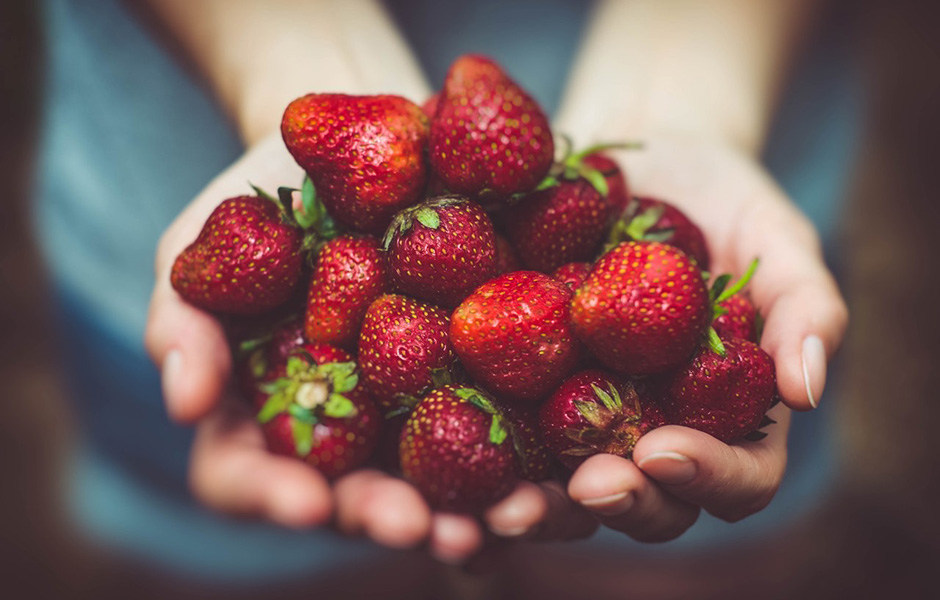A few weeks ago, on a Saturday, Tony and I got up early. We got dressed, put on our “don’t mind if they get muddy” shoes, and headed out to our favorite strawberry farm. The day before, they unexpectedly announced that they would be opening for a short time that weekend for the first picking. We love strawberries—especially freshly picked ones. So we weren’t going to pass up an opportunity to pick them earlier than we expected.
As we drove up the dirt road leading to the farm, we wondered how many people would already be picking when we’d arrive. The sky was grey with clouds and the temperature had dropped at least twenty degrees from the day before. When we pulled into the parking area, we could see a large field spread out before us, all overgrown with flowers and weeds.
“Guess we’re not picking there this year.” Tony said matter of factly.
The first few years we picked at this farm, the field had been lined with strawberry plants, heavy with beautiful red berries. But seeing it completely grown over, told us that we would need some direction as to where we were picking that day. We both got out of the car and made our way to the farm stand.
It was still early and the farmer was just opening the doors. We greeted him with a “Happy Strawberry Season,” to which he warmly welcomed us and gave us directions for the day’s picking. He explained we were to pick at a patch just down the road, so we got back in our car and headed that way.
When we arrived, we saw that a few people had already claimed their rows. So we looked for the unclaimed ones, the rows with the blue flags. We each took a row and started making our way down the field, picking the biggest, and juiciest looking berries we could find.
At first, picking strawberries feels like a treasure hunt, in which you feel very successful when you find one, two, or even three big red berries in a row. But even if you don’t normally spend your days working in a field, it doesn’t take long to realize that picking takes work. Bending or crouching over the small plants, and running your hands through the leaves to uncover berries, quickly becomes tedious. At some point, I said as much to Tony who reminded me that we were actually doing the easy part.
On Facebook, we follow the farm, and over the past few months we have seen the work it has taken them to plow, plant, and even protect the fields from unexpected late frost. To produce a good crop is a hard job—and we were reaping the benefits. Which made me wonder—how often do we reap the benefits of things we’ll never grasp the work it took to produce?
Our culture, in many ways, has strayed far from its agricultural roots. Yet every time we spend harvest season picking fruit where we live, I am reminded about how much the farming process has to teach us about life. This time, it was the importance of sowing and planting.
Because we have grocery stores full of food, we forget that the really good stuff comes from human hands toiling in the dirt. And because we have electricity, computers, and smartphones—we think life should be comfortable and automatic. But we reap comfort from inventions and products that took people years to make. And what we don’t realize is that our job, our life, is not just to enjoy the harvest. The truth is:
We all have been created to be farmers.
No, not all of us are called to work with dirt under our fingernails. But just as our strawberry farmer and his family work tirelessly, sowing and planting their fields—we all have our own fields to plant. It could be the work we do in our job, taking care of friends and neighbors, raising a family, or even that one idea that seems crazy, yet if it worked, would make a difference.
We are all called to sow and plant in our life.
Only, because our culture has made so many things easy for us, we mistake hard for wrong. When the pain involved with doing the things we were made to do, gets too much, we give up. We think we aren’t strong enough or the calling is not meant for us—because we have been taught that comfort is the goal. But the “hard” was never meant to disqualify us.
Just as it was not easy for the farmer to produce the most delicious crop of strawberries—anything we do of substance and worth, will be hard. In fact, the most abundant, world changing harvests, involve the most time, planting in the dark where no one but God sees you. Chances are, you are in the middle of your field—whether you know it or not—the question is:
What kind of harvest are you planting?
And do you believe you are called to this work?
Would you like more from Melissaschlies.com delivered to your inbox?
If so, subscribe here.












This is fantastic, Melissa. What a wonderful point that we are all in the middle of our fields doing the work, the question is whether we realize it and are sowing on purpose. I also love your point thta in our culture we forget about the work that goes in before reaping. Definitely something I’ll be thinking about now. Thank you!
“we mistake hard for wrong” — so true! Loved the analogy here!
I feel like I’m mostly on the planting and watering side, but I do feel it’s where God has called me, so I’m glad to be here!
Heather Bock
http://www.glimpsesofjesus.com
Me too, Heather. I think when we can see the purpose or at least can trust that the “hard” is an important part of our journey, it is easier to keep going.
I loved what you said about how hard work should detour us from what God has called us to do or to reap the harvest we are sowing. What a great point that God has made us strong enough to do what he has called us to, and to reap the harvest he has placed before us.